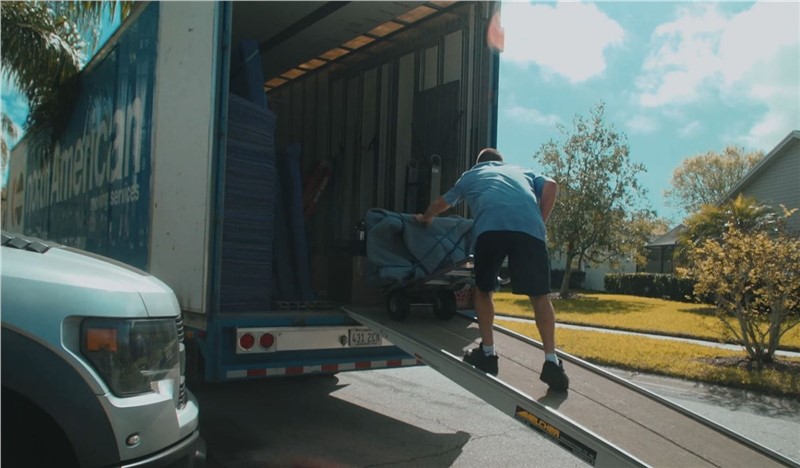Comprehending the Inclusions of moving and Freight Forwarding on the planet of Global and residential Shipping
Guiding through the complexities of moving and Freight forwarding can be tough. Both processes entail distinctive procedures and needs that are crucial for effective transport. Understanding the differences in logistics, paperwork, and risk management is crucial for people and organizations alike. This understanding can considerably affect the performance and security of shipments. Lots of are unaware of the details components that affect the total experience and outcomes. What variables should one consider to ensure a smooth changeover?
The Basics of moving and Freight Forwarding
moving and Freight forwarding are basic parts of the global logistics sector. They help with the transfer of items and individual possessions across residential and worldwide boundaries. moving largely entails the relocation of individuals or families, incorporating commercial and residential demands. It usually consists of packing, packing, transporting, and unboxing products at the location. In contrast, Freight forwarding is focused on the shipment of goods, often wholesale, making use of different transportation settings, such as sea, air, or land.freight forwarders act as middlemans, collaborating logistics to guarantee prompt delivery while steering with facility laws and custom-mades treatments. Both procedures call for mindful planning, company, and communication to ensure effectiveness and reduce disturbances. Recognizing these principles is essential for anyone included in logistics, as they prepared for even more innovative facets of delivery and transport monitoring.
Trick Elements of Freight Forwarding Services
Freight forwarding services incorporate numerous essential elements that assure smooth transportation of products. Key responsibilities of Freight forwarders include managing logistics, working with shipments, and handling customizeds clearance. Additionally, recognizing crucial delivery paperwork is crucial for compliance and efficient movement of freight.
Freight Forwarder Responsibilities
A reputable Freight forwarder plays a vital role in coordinating the transport of products, guaranteeing that shipments are handled successfully and in compliance with regulations. Their duties include different essential jobs, including picking excellent transport paths, negotiating Freight prices, and managing logistics. They act as middlemans between shippers and service providers, guaranteeing that freight is appropriately packaged and identified for safe transportation. Additionally, Freight forwarders track deliveries, providing updates to customers about the standing and expected shipment times. They also examine and take care of dangers connected with transport, advising insurance coverage alternatives as needed. By promoting interaction and documents, Freight forwarders improve the delivery procedure, decreasing possible delays and boosting overall supply chain efficiency.
Delivering Documents Fundamentals

Recognizing Custom-mades Clearance and Documentation
Exact documents is crucial in the customs clearance procedure, as it ensures conformity with different regulations. A review of custom-mades regulations highlights the complexities faced by shippers and Freight forwarders. Typical clearance difficulties can significantly influence delivery timelines and costs, making understanding this facet essential for reliable logistics.
Relevance of Accurate Paperwork
Steering with the intricacies of worldwide delivery requires an eager understanding of customizeds clearance and the essential function of documents. Accurate paperwork is essential for making sure that deliveries adhere to laws and reach their destinations immediately. Properly prepared papers, consisting of bills of lading, industrial billings, and packing checklists, help with smooth communications with personalizeds authorities. Inaccuracies can cause delivery delays, fines, or perhaps confiscation of items. Furthermore, detailed paperwork help in tracking shipments and fixing disagreements. Subsequently, organizations took part in moving and Freight forwarding should prioritize precise paperwork techniques to browse the detailed landscape of global delivery properly. This persistance not just simplifies procedures yet additionally boosts client satisfaction by ensuring prompt distribution.
Personalizeds Laws Summary
Steering customs regulations is a vital facet of global profession that directly impacts the success of moving and Freight forwarding operations. Reliable personalizeds clearance calls for an understanding of different policies, including tariffs, responsibilities, and import/export limitations. Precise documentation is important, as it guarantees compliance with lawful needs and assists in the efficient motion of products throughout borders. Key records usually include commercial billings, packaging listings, and bills of lading, which give in-depth information concerning the shipment. In addition, customizeds brokers play a crucial duty in steering intricate policies, working as intermediaries in between customizeds and carriers authorities. By maintaining detailed understanding of personalizeds processes, organizations can significantly lower delays and reduce prices related to worldwide delivery.
Common Clearance Obstacles
Many obstacles can emerge during the personalizeds clearance process, typically making complex the motion of goods throughout boundaries. One substantial problem wants paperwork, which can bring about delays and charges. Exporters and importers have to assure all required documents, such as billings, packaging checklists, and certificates of origin, is precise and total. Additionally, inconsistencies in evaluation can set off examination from customs authorities, leading to added responsibilities or assessments. Language barriers may additionally position difficulties, as miscommunication can lead to misconceptions relating to regulations. Additionally, adjustments in customizeds laws can create complication, requiring constant vigilance by shippers. Inevitably, overcoming these clearance challenges needs thorough prep work and a clear understanding of customs requirements to help with smooth global deals.
Product Packaging and Classifying Requirements
Although usually forgotten, packaging and labeling requirements play a crucial duty in the delivery process, making certain that items are shielded and conveniently identifiable throughout their journey. Proper product packaging safeguards items from damages during transportation, while likewise facilitating effective handling and storage. Making use of suitable products, such as bubble wrap, foam, or sturdy boxes, can stop breakage and loss.Labeling is just as crucial. Exact and clear labels share critical information, including the location, taking care of directions, and contents. Labels have to follow guidelines specific to domestic and global shipping, which might consist of hazardous materials recognition or customs declarations.Moreover, standardized labeling techniques simplify the tracking process and improve total logistics efficiency. By adhering to product packaging and labeling needs, businesses lessen the threat of hold-ups, damage, or misdelivery. Ultimately, these methods add greatly to the success of moving and Freight forwarding operations, making sure a smooth delivery experience try this out for all events involved
Tracking Shipments: Value and Approaches
Effective packaging and labeling set the foundation for effective delivery administration, yet tracking shipments is equally necessary in the delivery procedure. Delivery monitoring provides real-time exposure, which assists organizations and consumers keep track of the development of their products. This openness enhances client complete satisfaction, because customers can remain educated concerning distribution timelines and any possible delays.Several approaches promote efficient tracking. Barcode scanning is a common approach, making use of special identifiers to keep an eye on bundles throughout their journey. In addition, general practitioner innovation enables precise area monitoring, permitting timely updates and boosted logistics monitoring. Numerous shipping business now offer digital platforms and mobile applications that supply commercial relocation company individuals with easy access to tracking information.The importance of shipment tracking can not be overemphasized; it decreases the threat of shed or damaged items, enhances functional effectiveness, and fosters depend on between carriers and recipients. Therefore, incorporating effective monitoring methods is essential for successful residential and worldwide delivery operations.
Insurance coverage Options for Your Goods
Safeguarding insurance coverage for items in transit is a vital consideration for people and businesses alike. Insurance policy options differ based upon the type of delivery, value of items, and specific dangers entailed. Usual types include provider responsibility, which covers loss or damages while en route, and full-value insurance coverage, giving comprehensive insurance coverage for the complete worth of the goods.Shippers may also think about aquatic insurance for international shipments, securing against dangers connected with sea transportation. It is important to examine the certain demands of the delivery and assess the terms and conditions of any policy.Furthermore, comprehending exclusions and restrictions is important to stay clear of possible voids in insurance coverage. Shippers should engage with insurance experts to explore tailored solutions that fit their distinct circumstances. Eventually, investing in the best insurance can mitigate financial threats and give satisfaction during the shipping process.
Picking the Right moving and Freight Forwarding Solution
When choosing a moving and Freight forwarding service, it is essential for companies and individuals to carefully evaluate their details demands and top priorities. Elements such as the volume of items, location, and timeline play a significant role in this decision-making procedure. Investigating various service providers is advisable; contrasting their services, pricing, and consumer evaluations can disclose useful insights.Additionally, it is required to think about the experience and proficiency of the solution supplier in handling details kinds of cargo, specifically for worldwide deliveries that may entail custom-mades clearance. Transparency in rates, including any surprise fees, need to likewise be scrutinized.Furthermore, evaluating the degree of client assistance supplied is vital, as timely communication can alleviate issues throughout transit (lcl shipping). Confirming the schedule of insurance choices guarantees that products are protected throughout the shipping procedure. By taking these actions, people and companies can make educated options that line up with their logistics needs
Frequently Asked Inquiries
What Kinds of Product Can Be Shipped Globally?

How Do Delivery Costs Differ Between Various Providers?
Shipping prices differ greatly in between carriers as a result of aspects such as service rate, cargo kind, distance, and additional solutions used. Each provider's pricing version shows these variables, influencing overall delivery costs for customers.
Can I Ship Hazardous Products or Perishables?
Shipping unsafe materials and perishables is subject to rigorous policies. Service providers typically require certain packaging, labeling, and paperwork. Carriers must ensure conformity with global and local legislations to stay clear of penalties and ensure risk-free transportation.
What Should I Do if My Shipment Is Delayed?
When confronted with a shipment delay, one ought to initially contact the copyright for updates. Then, assess any notices got, analyze alternative options, and maintain all events educated about the situation to lessen interruptions.
Exist Weight Purview for Delivery Containers?
Weight restrictions for delivery containers differ relying on variables like container dimension and delivery guidelines. Typically, basic containers have a maximum gross weight of around 30,000 to this website 32,000 kilograms to ensure secure transportation and handling. In contrast, Freight forwarding is focused on the shipment of goods, often in bulk, utilizing various transportation modes, such as air, land.freight, or sea forwarders act as intermediaries, coordinating logistics to guarantee prompt delivery while steering through complex guidelines and custom-mades procedures. Key responsibilities of Freight forwarders consist of handling logistics, coordinating deliveries, and managing customizeds clearance. A reputable Freight forwarder plays a vital role in working with the transport of goods, making certain that shipments are handled successfully and in compliance with laws. Efficient packaging and labeling established the foundation for effective shipment administration, but tracking deliveries is equally crucial in the shipping procedure. Numerous delivery companies currently offer electronic platforms and mobile applications that supply users with simple accessibility to tracking information.The significance of delivery tracking can not be overemphasized; it minimizes the danger of shed or damaged products, boosts operational performance, and fosters depend on in between receivers and shippers.